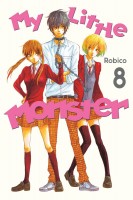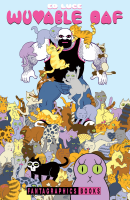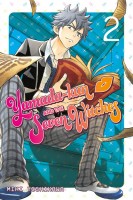My News and Reviews
Two reviews were posted last week at Experiments in Manga. First up was my review of the short comic The Ring of Saturn by Kaiju, a creative team made up of Kate Rhodes and Jennifer Xu. I had previously read the comic online at Sparkler Monthly and loved it, but now it’s available in print! The second review was of Takako Shimura’s Wandering Son, Volume 8. The series is an incredibly important one to me, and I’m very glad that it’s being released in English. The eighth volume ends on a bit of a cliffhanger, and I have no idea when the ninth volume will be released, so now I’m doubly anxious.
Elsewhere online, the MASSIVE/Gay Manga tumblr talks a bit about the success of Gengoroh Tagame’s first manga for a general audience, My Brother’s Husband. It sounds like there’s an ongoing effort to license the series for an English-language release, which I really hope happens! Drawn & Quarterly made an interesting licensing announcement of its own, Yeon-sik Hong’s Uncomfortably, Happily. You don’t hear about many new manhwa being released in English these days. (Although Netcomics does seem to be making a quiet comeback.) Frederik L. Schodt spoke briefly on To the Best of Our Knowledge about Osamu Tezuka and his works. Finally, Organization Anti-Social Geniuses continues its Manga Advice series, this time interviewing four manga designers.
Quick Takes
 My Little Monster, Volume 8 by Robico. The last volume of My Little Monster got my hopes up as the series seemed to be regaining its momentum. I wouldn’t say my hopes were dashed reading the eight volume since there were plenty of funny and dramatic moments, not to mention the introduction of a new character as well as several confessions of love, but the series still isn’t going anywhere fast. Both Robico and the characters know this, too, and even comment on the fact that nothing has really changed all that much from the beginning of the story. Although, I do suppose that it’s an important development that Shizuku and Haru are now officially a couple. (Except that I thought they already were? Guess I was wrong.) My Little Monster does frustrate me a little with all of its one step forward, one step back approach to storytelling and relationships, and it seems to have forgotten some of the major plot threads that were started earlier, but I do still like the series as a whole. My Little Monster can be very funny at times and the quirky characters continue to amuse me. So, I’ll likely keep reading.
My Little Monster, Volume 8 by Robico. The last volume of My Little Monster got my hopes up as the series seemed to be regaining its momentum. I wouldn’t say my hopes were dashed reading the eight volume since there were plenty of funny and dramatic moments, not to mention the introduction of a new character as well as several confessions of love, but the series still isn’t going anywhere fast. Both Robico and the characters know this, too, and even comment on the fact that nothing has really changed all that much from the beginning of the story. Although, I do suppose that it’s an important development that Shizuku and Haru are now officially a couple. (Except that I thought they already were? Guess I was wrong.) My Little Monster does frustrate me a little with all of its one step forward, one step back approach to storytelling and relationships, and it seems to have forgotten some of the major plot threads that were started earlier, but I do still like the series as a whole. My Little Monster can be very funny at times and the quirky characters continue to amuse me. So, I’ll likely keep reading.
 Say I Love You, Volume 7 by Kanae Hazuki. Although Mei and Yamato are clearly the main characters of Say I Love You, large portions of the series are actually devoted to their friends, classmates, and families. After showing the outcome of Mei and Yamato’s date (which his sister crashed before his older brother was able to drag her away) and the result of their first night spent completely alone together, the seventh volume largely focuses on Megumi’s story. After Megumi was rejected by Yamato, who remains devoted to Mei, she has been trying to ruin all of Mei’s new-found friendships. She actually ends up making herself miserable in the process and ends up withdrawing more and more from the people who legitimately care about her. Like many of the characters in Say I Love You, Megumi is dealing with some pretty serious personal issues. Her self-confidence has been destroyed, she doesn’t trust other people, and her relationships are falling apart. As unlikeable as she can be at times, it’s still heartbreaking to see her intense unhappiness. But the growth and development of the characters in Say I Love You is excellent.
Say I Love You, Volume 7 by Kanae Hazuki. Although Mei and Yamato are clearly the main characters of Say I Love You, large portions of the series are actually devoted to their friends, classmates, and families. After showing the outcome of Mei and Yamato’s date (which his sister crashed before his older brother was able to drag her away) and the result of their first night spent completely alone together, the seventh volume largely focuses on Megumi’s story. After Megumi was rejected by Yamato, who remains devoted to Mei, she has been trying to ruin all of Mei’s new-found friendships. She actually ends up making herself miserable in the process and ends up withdrawing more and more from the people who legitimately care about her. Like many of the characters in Say I Love You, Megumi is dealing with some pretty serious personal issues. Her self-confidence has been destroyed, she doesn’t trust other people, and her relationships are falling apart. As unlikeable as she can be at times, it’s still heartbreaking to see her intense unhappiness. But the growth and development of the characters in Say I Love You is excellent.
 Wuvable Oaf by Ed Luce. I was introduced to Ed Luce and his work thanks to TCAF 2014’s Queer Mixer where I learned that Fantagraphics would be releasing a collection of his most well-known creation, Wuvable Oaf. The volume opens with “Music Is My Boyfriend,” the first major Wuvable Oaf story arc which follows the titular Oaf, an ex-pro wrestler who now spends his time crafting handmade dolls (stuffed with his own body hair) and working at Oaf’s Home for Wayward Kitties Who Are Really Cute & Need Lotsa Love, and his relationship with Eiffel, a much smaller and extremely surly fellow who is the lead singer of Ejaculoid, a disco grindcore band. The volume also includes a collection of Wuvable Oaf short stories and “The Official Handbook to the Oafiverse,” which contains detailed (and humorous) character profiles among other things. Oaf himself is adorable and an absolute sweetheart. Although occasionally kind of gross, Wuvable Oaf can be surprisingly sweet and charming, filled with all sorts of marvelous queerness. Wuvable Oaf is also very, very funny. And it just so happens to be a cat comic, too!
Wuvable Oaf by Ed Luce. I was introduced to Ed Luce and his work thanks to TCAF 2014’s Queer Mixer where I learned that Fantagraphics would be releasing a collection of his most well-known creation, Wuvable Oaf. The volume opens with “Music Is My Boyfriend,” the first major Wuvable Oaf story arc which follows the titular Oaf, an ex-pro wrestler who now spends his time crafting handmade dolls (stuffed with his own body hair) and working at Oaf’s Home for Wayward Kitties Who Are Really Cute & Need Lotsa Love, and his relationship with Eiffel, a much smaller and extremely surly fellow who is the lead singer of Ejaculoid, a disco grindcore band. The volume also includes a collection of Wuvable Oaf short stories and “The Official Handbook to the Oafiverse,” which contains detailed (and humorous) character profiles among other things. Oaf himself is adorable and an absolute sweetheart. Although occasionally kind of gross, Wuvable Oaf can be surprisingly sweet and charming, filled with all sorts of marvelous queerness. Wuvable Oaf is also very, very funny. And it just so happens to be a cat comic, too!
 Yamada-kun and the Seven Witches, Volume 2 by Miki Yoshikawa. Despite the manga’s title, the witches of Yamada-kun and the Seven Witches have yet to make their presence known, though I’m assuming it’s only a matter of time. I enjoyed the first volume Yamada-kun and the Seven Witches a great deal. I enjoyed the second as well, but it didn’t manage to leave as big of an impression on me. The fanservice seemed a little more forced in the second volume, too. Still, the series is a comedy more than anything else and I continue to find it to be highly entertaining. (But then again, I do have a proclivity towards stories that include body-swapping and gender play.) Yamada has discovered that he has a strange ability that allows him to switch bodies with another person if they kiss. He doesn’t know why he has this power, nor does he completely understand how it works. But even so, he and the few people who know about it are more than willing to use Yamada’s peculiar skill to their advantage, whether it’s appropriate or not. (Often it’s not.) This of course means there’s all sorts of kissing and other antics going on.
Yamada-kun and the Seven Witches, Volume 2 by Miki Yoshikawa. Despite the manga’s title, the witches of Yamada-kun and the Seven Witches have yet to make their presence known, though I’m assuming it’s only a matter of time. I enjoyed the first volume Yamada-kun and the Seven Witches a great deal. I enjoyed the second as well, but it didn’t manage to leave as big of an impression on me. The fanservice seemed a little more forced in the second volume, too. Still, the series is a comedy more than anything else and I continue to find it to be highly entertaining. (But then again, I do have a proclivity towards stories that include body-swapping and gender play.) Yamada has discovered that he has a strange ability that allows him to switch bodies with another person if they kiss. He doesn’t know why he has this power, nor does he completely understand how it works. But even so, he and the few people who know about it are more than willing to use Yamada’s peculiar skill to their advantage, whether it’s appropriate or not. (Often it’s not.) This of course means there’s all sorts of kissing and other antics going on.
